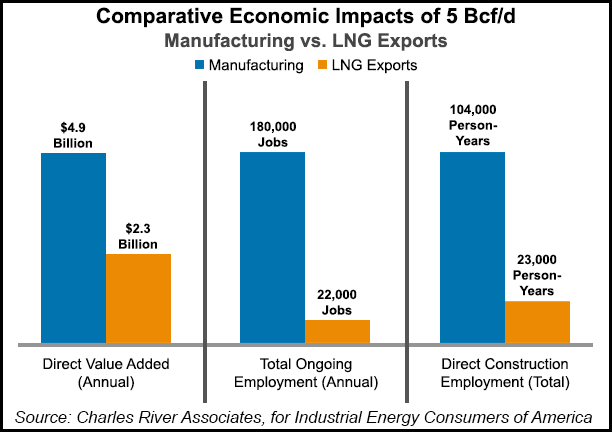Regulatory | LNG | NGI All News Access | NGI The Weekly Gas Market Report
Manufacturers Urge DOE’s Perry to Enact Moratorium on LNG Export Approvals
An organization representing manufacturers has asked Department of Energy (DOE) Secretary Rick Perry to enact a moratorium on approvals for liquefied natural gas (LNG) exports, and has accused a pro-export group of providing “misleading and incorrect” information.

In a letter to Perry last Thursday, the Industrial Energy Consumers of America (IECA) said it worries that unchecked LNG exports could drive up domestic prices for natural gas, which would in turn devastate manufacturing jobs.
IECA said its letter was in response to a separate letter the Center for Liquefied Natural Gas (CLNG) sent to Perry in March. According to IECA, CLNG advocated for expedited approval of pending LNG export permits before the DOE, to countries with and without a free trade agreement (FTA) with the United States.
DOE has approved 52.9 Bcf/d of LNG exports to FTA countries, IECA said, and has approved or conditionally approved an additional 17 Bcf/d to non-FTA countries, which equates to nearly 93% of domestic natural gas demand in 2016. The organization added that FERC reported 10.4 Bcf/d of LNG export capacity is currently under construction.
“This is a stunningly significant amount of natural gas exports, which raises enormous concerns of future price risk upon trillions of dollars of existing and future U.S. manufacturing facilities,” IECA President Paul Cicio said. “There is absolutely no need to expedite approval of further applications to export. In fact, we urge the DOE to halt further approvals until the DOE or Congress defines public interest and with that determination, reconsider the status of applications to export.”
Besides a moratorium on export approvals, IECA also asked Perry to have DOE establish a process for monitoring LNG exports and to make adjustments to authorized export volumes when necessary. Regulatory authority has been granted to DOE under the Natural Gas Act, IECA said. It also asked the Trump administration to establish a national LNG export policy consistent with its vocal support for fair trade.
“Shipping LNG to countries that do not have free trade agreements with the U.S. is inconsistent with fair trade and reduces the administration’s negotiating leverage and rewards these countries,” Cicio said. He later added that “countries should not be rewarded with U.S. LNG before providing fair trade for our manufactured products.”
IECA also took issue with CLNG’s assertion that the U.S. “has an abundance of natural gas,” and that data from the DOE’s Energy Information Administration (EIA) supported its assertion, with domestic natural gas production exceeded demand by about 1.4 Tcf in 2015. IECA said CLNG also erred when it claimed EIA predicts domestic production will exceed demand for at least the next 20 years.
“CLNG’s use of EIA data is not correct,” Cicio said, adding that the EIA’s Annual Energy Outlook (AEO) for 2017 showed a surplus of just 0.7 Tcf in 2015. “More importantly, CLNG’s claim that EIA predicts that production will outpace consumption is misleading and incorrect. CLNG is only comparing production versus domestic consumption. The correct way to address whether the U.S. has a surplus or not, is to include EIA’s prediction of net exports…”
“If LNG exports reach the level of already approved applications, the U.S. will be in a deficit of natural gas. In summary, the EIA is not predicting a surplus of supply that would be available for additional LNG exports. In fact, if any additional export capacity comes online that is not included in the EIA AEO 2017, the U.S. annual surplus changes to a deficit.”
According to IECA, a study performed by Charles River Associates concluded that the use of natural gas in manufacturing jobs creates eight times more jobs than LNG exports. Manufacturing jobs would be destroyed, IECA contends, if LNG exports were to raise domestic natural gas prices in the long-term.
Last month, CLNG and the Natural Gas Supply Association (NGSA) issued a joint statement praising an executive order (EO) from President Trump that called for sweeping changes in the energy sector. Among the EO’s directives was an order rescinding guidance from the White House Council on Environmental Quality, unveiled during the Obama administration, designed to help federal agencies quantify the effects of greenhouse gas emissions. NGSA and CLNG interpreted the move as the removal of an impediment to LNG exports.
Responding to IECA’s letter to Perry, NGSA spokesman Hinson Peters told NGI on Monday that Cicio’s position “relies on information that pre-dates the shale revolution and is outdated. In fact, EIA’s data also shows that the U.S. has significant [natural gas] reserves, 324 Tcf.
“Numerous independent academic papers have shown that LNG exports will be advantageous for the United States, including the DOE’s own study which concluded that ‘in all of the scenarios analyzed in this study…the U.S. would experience net economic benefits from increased LNG exports.’
“This is not a ‘zero sum game,'” Peters said. “The U.S. has more than enough natural gas to benefit from exports and provide affordable natural gas to consumers and manufacturers at home.”
Late last week, the Federal Energy Regulatory Commission, in its annual State of the Markets Report, said LNG exports contributed to demand for the first time in 2016, after Cheniere Energy Inc. placed the first train at its Sabine Pass terminal into service last February and added a second train last fall.
© 2024 Natural Gas Intelligence. All rights reserved.
ISSN © 1532-1231 | ISSN © 2577-9877 | ISSN © 1532-1266 |
